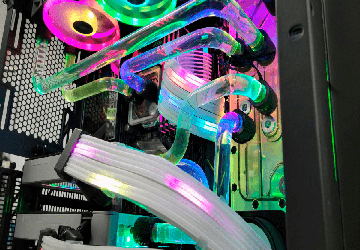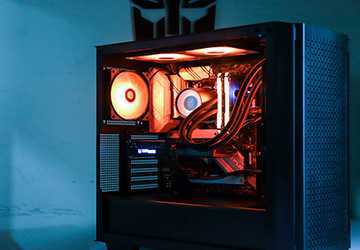Who Should Opt for Liquid Cooling in Their PC?
In an era where high-performance computing is no longer a luxury but a necessity, thermal management has become a cornerstone. While air-cooling options have served us well over the years, liquid cooling has opened up new horizons for casual and hardcore computer users. Here, we discuss the benefits of liquid cooling, determine who needs liquid cooling, and contrast the classic air cooling vs. fluid cooling debate in modern computer configurations.

The Gamer's Perfect Scenario: Consistency and Longevity
The players most interested in the benefits of liquid cooling are gamers. The reason is simple: high-performance gaming requires much computing work, and excess heat is an inevitable by-product. A fluid cooling system ensures your gaming gear stays cool even during marathon sessions. This cooling not only improves performance but also extends the life of your hardware. So, if you're looking for an unparalleled gaming experience, liquid cooling isn't just an option; it's a must.
Beyond Gaming: Why Pros Should Care
Thinking that liquid cooling is only for the gaming community is a mistake. Today, professionals working on 3D modeling, big data, or AI-driven tasks may also choose liquid cooling as a game-changer. The complexity of these tasks can put tremendous stress on computer systems. However, liquid cooling offers solutions to keep system temperatures more relaxed, improving reliability and performance.
The Air Cooling vs. Liquid Cooling Debate: It's Time to Settle It
The air-cooling vs. liquid-cooling debate isn't about picking a winner; This is where your options are tailored to your specific needs. Air cooling may be enough for basic tasks but needs more finesse and direct cooling capabilities than liquid cooling.
Adapt liquid cooling to your needs: custom and pre-built systems
For DIY enthusiasts, liquid cooling offers many customization options. Not only can you choose individual components such as pumps, radiators, or even colored liquids, but you can also ensure that the furniture matches the aesthetics of your study or playroom. If there are many high-quality pre-built liquid cooling solutions.
Is liquid cooling worth the investment?
Regarding cost, liquid cooling systems have advantages over traditional air cooling systems. However, this cost is an investment in better performance, longer hardware life, and a smoother computing experience. When you weigh these benefits of liquid cooling against the initial cost, you'll often find that it's a worthwhile investment.
The right choice for liquid cooling
So, ultimately, who needs liquid cooling? Essentially, anyone who wants to push the boundaries of what their computer system can do, whether it's gaming, professional tasks, or advanced multitasking. The benefits of liquid cooling extend beyond just the cooling system. They open the life of your hardware and ensure quieter, more efficient operation.
Overview: Modify Cooling Mode
As computing tasks become more complex and demanding, thermal regulation issues must be addressed. As traditional cooling methods become obsolete, liquid cooling is the ultimate solution for those seeking peak performance. In this article, we'll dive deeper into the benefits of liquid cooling, explore who needs liquid cooling, and revisit the age-old air cooling vs. fluid cooling debate.
The Overclocker's Haven: Optimizing Performance
Overclockers will significantly benefit from the advantages of liquid cooling. Pushing the performance of your processor and graphics card beyond their factory settings may result in increased heat production. Due to its high thermal conductivity, the liquid cooling system can effectively dissipate excess heat, allowing for stable overclocking operation. For those looking to get the most performance from their hardware, liquid cooling is no longer an option but more of a requirement.

Silent operation: an underrated advantage
Liquid cooling systems have a clear advantage over their air-cooled counterparts regarding noise levels. The fluid dynamics of liquid cooling result in quieter operation, which is invaluable in professional environments where every decibel counts. If your job requires concentration and calm, liquid cooling can reduce noise pollution in the workplace.
Lifespan and Reliability Comparison: Air Cooling vs. Liquid Cooling
The debate between air and liquid cooling extends to durability and system reliability. Although air cooling systems are generally easier to install and maintain, they offer different durability benefits than liquid cooling systems. Because liquid cooling solutions operate more efficiently, they put less stress on hardware components, extending the life of your system.
Taking aesthetics to the next level: visual elements
Another often overlooked aspect of liquid cooling is its aesthetic value to your PC setup. With customizable liquid colors and dynamic light effects, liquid cooling units can accentuate the aesthetic theme of your space. This is especially popular among gamers and computer enthusiasts who value the visual appeal of their setups.
Cost Analysis: Liquid Cooling as a Long-Term Commitment
While liquid cooling systems cost more upfront, it's essential to consider them a long-term investment. The savings in power consumption and extended life of hardware components can offset the initial cost. Additionally, the tangible benefits of liquid cooling—improved performance, quieter operation, and good looks—often make the investment well worth it.
Conclusion: Who should switch to liquid cooling?
So, who needs liquid cooling? The answer may be more comprehensive than you think. Gamers, professionals, overclockers, and anyone looking to maximize the performance and longevity of their computer system should consider liquid cooling as a viable cooling solution. Due to its countless benefits, liquid cooling has grown from a niche choice to a mainstream one for industry professionals.
Related Posts
- 4 Ways Smart Home Devices Can Simplify Your Daily Routine
- Top 10 IT Blogs for Staying Informed on Tech Trends
- What are the Best Apps for Learning a New Language?
- How to Protect Your Computer from Viruses and Malware?
- How to Develop Cross-Platform Apps: Tools and Techniques
- When is the Best Time to Buy Electronics?